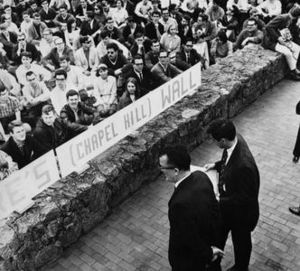North Carolina Speaker Ban facts for kids

On June 26, 1963, a new rule called the Speaker Ban Law was passed in North Carolina. This law said that certain people could not speak on any campus of the University of North Carolina. It banned anyone known to be a member of the Communist Party, or who wanted to overthrow the U.S. government, or who used the Fifth Amendment to avoid answering questions about communist ties. The law was passed very quickly, with almost no discussion.
To challenge this law, students invited two speakers who were considered communists. When the university stopped them from speaking on campus, students, led by their president Paul Dickson, took the state to court. A federal court later decided that the Speaker Ban Law was not valid because it was too unclear.
Contents
Why the Law Was Made
In the early 1960s, there was a lot of social change happening in North Carolina. People were protesting against segregation, which was the unfair separation of people based on their race. Students and teachers from the University of North Carolina often joined these protests. Even though the university itself wasn't officially involved, many people thought it was connected to the protests.
Some lawmakers in the state government were very conservative. They felt that the university was causing trouble. During the Cold War, many people were afraid of communism. These lawmakers worried that communist speakers might be encouraging the protests and spreading their ideas at the university. They believed that a law could stop this from happening.
How the Law Was Passed
The Speaker Ban Law was passed very quickly in the final hours of the 1963 state legislative meeting. A lawmaker named Phil Godwin introduced the bill. There were no special meetings to discuss it, and most lawmakers didn't even know it was coming. The bill was voted on and passed in the House of Representatives in just four minutes.
Then, it moved to the state Senate. There, it was also rushed through. The rules were changed so that senators could vote on it right away, without much discussion. Even though some senators tried to speak against it, their concerns were mostly ignored. The bill passed quickly.
The Governor at the time, Terry Sanford, was against the law. However, back then, the governor of North Carolina did not have the power to stop a bill from becoming law.
Why People Disliked the Law
Many people argued that the Speaker Ban Law went against the First Amendment of the U.S. Constitution. This amendment protects freedom of speech. People also pointed out that it was hard to decide who was a "known communist."
Some critics even joked that historical figures like Robert E. Lee, a general from the Civil War, would have been banned from speaking. This was because he had fought against the U.S. government, which could be seen as trying to overthrow it.
The Legal Fight Against the Law
After the law was passed, many students, teachers, and university leaders strongly opposed it. They saw it as an attack on their freedom to speak and learn. To challenge the law, students at the University of North Carolina at Chapel Hill invited two speakers, Herbert Aptheker and Frank Wilkinson, to come to campus.
As expected, the university would not let them speak on campus. So, the speakers stood just outside the university's stone wall, in the town of Chapel Hill, and spoke to the crowd from there. The university's refusal to let them speak on campus became the reason for a lawsuit against the university and the state.
On February 19, 1968, a group of federal judges in Greensboro decided that the Speaker Ban Law was invalid. They said it was too vague, meaning it wasn't clear enough about who it applied to.
Remembering the Event
In 2011, a special granite marker with a bronze plaque was placed near the spot where Aptheker and Wilkinson spoke. This memorial helps people remember the fight for free speech at the university.
 | James B. Knighten |
 | Azellia White |
 | Willa Brown |

